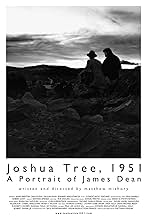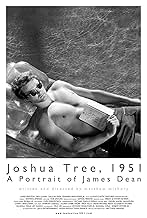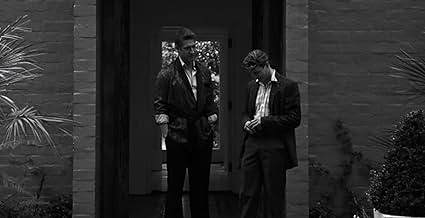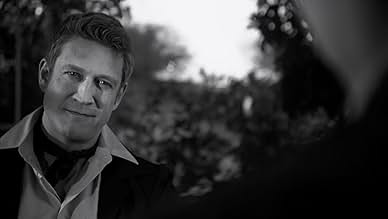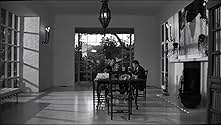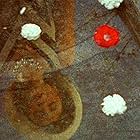Joshua Tree, 1951 is the provocative and mesmerizing experimental portrait of an icon.Joshua Tree, 1951 is the provocative and mesmerizing experimental portrait of an icon.Joshua Tree, 1951 is the provocative and mesmerizing experimental portrait of an icon.
- Awards
- 3 wins & 2 nominations total
Azrael Renea des Reves
- Pool Guest
- (as Azrael Renea)
- Director
- Writer
- All cast & crew
- Production, box office & more at IMDbPro
Featured reviews
For James Dean fans -- who only made three feature films in his lifetime (East of Eden, Rebel Without a Cause and Giant) -- this will lamentably NOT be the biopic many would be hoping for. The title actually gives this away by calling itself a "portrait" of Dean by highlighting a brief portion of his life in Joshua Tree, California in 1951. Dean didn't make "it big" in film until 1955 (the year of his death) and his two consecutive Oscar nominations were posthumous in 56 and 57. This small film highlights a small phase of Dean's life as he struggles with acting and his drive to become famous.
In the film, Dean is taking an acting class to learn the ropes and establish his footing in southern California while he lives with a nice classmate who apparently has some deeper feelings for him -- the film is based upon the writing of this roommate. Much has been said about Dean living a bisexual lifestyle and this film "goes there" -- some won't want to see how much skin is on display here (there isn't even that much but it might upset some is all) -- although the film never really goes into any of the particulars with any of Dean's relationships so the audience never knows if Dean felt anything for anybody else or if all of his moves were calculated and methodical ... hoping something would come from this fling or that encounter.
The film feels rather pretentious at times (it is about James Dean!) but its stylish elements save it from being loathsome and detestable while the acting feels amateurish yet adequate. The landscape and views of Joshua Tree are breathtakingly beautiful and these simple moments in the film are gorgeously shot. There are parts of this that are not great but just when a moment is becoming almost unbearable the film offers up something commendable that makes one take notice.
There is a lot of promise here (like its subject matter) and it is disappointing that the film couldn't be more (again ... like its subject matter). This is probably a hard film to find and track-down and it won't be for everybody; but those fans of Dean's work probably won't mind seeing this small tribute to the star trying to make it in 1951 while not catching any breaks. It isn't much and is rather lite.
Joshua Tree, 1951 is more "art" than anything else ... it is a what if (as most of it is merely alleged; but what isn't?). James himself is a what if ... if only. There was something there with Dean ... and there is something here too. It just comes up short and never lives up to its potential. Again ... truly fitting and the disappointment one feels as the credits role is the exact disappointment that should be felt for this life that was cut short.
If this were the filmmaker's intent, I'd say "genius"; but I'm not certain of that. As is, though, ... it is quite good.
In the film, Dean is taking an acting class to learn the ropes and establish his footing in southern California while he lives with a nice classmate who apparently has some deeper feelings for him -- the film is based upon the writing of this roommate. Much has been said about Dean living a bisexual lifestyle and this film "goes there" -- some won't want to see how much skin is on display here (there isn't even that much but it might upset some is all) -- although the film never really goes into any of the particulars with any of Dean's relationships so the audience never knows if Dean felt anything for anybody else or if all of his moves were calculated and methodical ... hoping something would come from this fling or that encounter.
The film feels rather pretentious at times (it is about James Dean!) but its stylish elements save it from being loathsome and detestable while the acting feels amateurish yet adequate. The landscape and views of Joshua Tree are breathtakingly beautiful and these simple moments in the film are gorgeously shot. There are parts of this that are not great but just when a moment is becoming almost unbearable the film offers up something commendable that makes one take notice.
There is a lot of promise here (like its subject matter) and it is disappointing that the film couldn't be more (again ... like its subject matter). This is probably a hard film to find and track-down and it won't be for everybody; but those fans of Dean's work probably won't mind seeing this small tribute to the star trying to make it in 1951 while not catching any breaks. It isn't much and is rather lite.
Joshua Tree, 1951 is more "art" than anything else ... it is a what if (as most of it is merely alleged; but what isn't?). James himself is a what if ... if only. There was something there with Dean ... and there is something here too. It just comes up short and never lives up to its potential. Again ... truly fitting and the disappointment one feels as the credits role is the exact disappointment that should be felt for this life that was cut short.
If this were the filmmaker's intent, I'd say "genius"; but I'm not certain of that. As is, though, ... it is quite good.
I was born in April of 1956. The real James Dean hadn't been dead for a year yet and so I hadn't seen his movies or his images until my teen years. The real James Dean was OK looking, but James Preston's James Dean is the stuff of dreams and fantasies that stay in your head longer. The softer character portrayal and erotic sensual man on man scenes are nothing shameful to watch and you see the beauty of both the inside of Dean's (and Preston's) spirit and what made Jimmy as himself. The flow of this movie stayed in it's artistic, sensuous style and to me, that was the beauty of it. It was like getting an intimate glimpse into someone's life you didn't know much of before, but now you feel privileged for the knowledge of it if that makes sense. All the actors did a good job, but it was the relationship between Dean and his roommate that I wanted to see and wasn't disappointed. I can watch this film over and over because of it's sensitive, alluring presentation presented so nicely by James Preston.
4B24
From my point of view this rather dreamy film-noir mood piece adds little to our understanding of James Dean as an actor. I followed his career at the time in such magazines as Photoplay and Modern Screen, saw all his movies as soon as they came out, and read the clippings avidly. No ordinary fan at the time believed even the slightest hint that he was gay. Indeed, that whole concept as it is now so glibly thrown about had yet to be taken up by Middle America. He was then defined in part by playing opposite Natalie Wood, Julie Harris, and Elizabeth Taylor. Ditto his penchant for fast cars. If there are in fact scenes in his three films that can be interpreted today as demonstrative of overtly erotic interaction with the likes of Sal Mineo or Rock Hudson, they prove very little about the actor himself.
On the other hand, this film is a compelling cinematic portrait constructed around a half-dozen major biographical studies that provide independent evidence of Dean's early career apart from those films. That limited portrait is what the film is about, not all the other loose ends of his professional career. It is a picture made up of second and third-hand stuff as seen through the virtual lens of a Kodak Brownie camera (I had one of those myself at the time). But just because the portrait is presented in a heavily shaded black- and- white panorama of the Mojave Desert purportedly in 1951 is no reason to regard it as historically superior to the more linear and Technicolor alternative that has yet to be filmed.
James Dean deserves a film version of his life that explores more fully his childhood, his teens, his years in New York, his sexuality (admit it, folks, he was gay), his pixie-like sense of humor, his first breakthrough into major films, and the effect he had on both co- workers and contemporary fans. This present film is like a slowly constructed line drawing, moving snail-like across the page.
On the other hand, this film is a compelling cinematic portrait constructed around a half-dozen major biographical studies that provide independent evidence of Dean's early career apart from those films. That limited portrait is what the film is about, not all the other loose ends of his professional career. It is a picture made up of second and third-hand stuff as seen through the virtual lens of a Kodak Brownie camera (I had one of those myself at the time). But just because the portrait is presented in a heavily shaded black- and- white panorama of the Mojave Desert purportedly in 1951 is no reason to regard it as historically superior to the more linear and Technicolor alternative that has yet to be filmed.
James Dean deserves a film version of his life that explores more fully his childhood, his teens, his years in New York, his sexuality (admit it, folks, he was gay), his pixie-like sense of humor, his first breakthrough into major films, and the effect he had on both co- workers and contemporary fans. This present film is like a slowly constructed line drawing, moving snail-like across the page.
JOSHUA TREE 1951 is brilliant. It touched my heart so deeply, there were tears running down my cheeks as it concluded. Because of the film, I FELT James Dean. I FELT the greatness of his talent and I felt the pain of his choices. Not many films can do this. Director Matthew Mishory captures the terrible conflict between what an artist must do for his art and what he gives up - the risks he must take, the life he gives up in order to progress, to honor, to grow his art - and the artist's personal life - love, relationships, family, stability. With the specter of Fate hanging heavily over the film like the thick clouds of the Joshua Tree desert hanging over the characters, Mishory explores the concept of "destiny". Are the artist's choices inevitable?
Good movies entertain. Great movies linger in the viewer's mind long after the end credits roll. Joshua Tree, 1951: A Portrait of James Dean does exactly that. It's been days since I viewed this amazing film at the Seattle International Film Festival and I can't get it out of my mind.
To appreciate this film one must cast aside all preconceived notions of who the so-called hyper-cool stud James Dean was - or wasn't. One must surrender to the film's almost dream-like, nonlinear storyline. One also must also not be homophobic to enjoy this unique gem of a film.
Joshua Tree, 1951 is simply beautiful, from the surprising opening scene to the end. James Preston, playing James Dean, gives a raw portrayal of the price Dean paid to become a star. Preston skillfully plays Dean as he was before the world knew him: fresh off the farm, seething with ambition, hungry for knowledge. Dan Glenn masterfully plays The Roommate (rumored to be real-life former Dean roommate Bill Bast), painting a remarkably beautiful portrait of love that could never be in the early 1950s. The audience sympathizes The Roommate as the one who paid the life-long price for loving Dean. Ed Singletery, playing Roger, is a wonderful metaphor for the Hollywood "machine," and Dalilah Rain, playing Violet, is a delight to watch.
The cinematography is sure to attract the attention of award ceremonies and will be studied in film schools for years to come.
Go see this film!
To appreciate this film one must cast aside all preconceived notions of who the so-called hyper-cool stud James Dean was - or wasn't. One must surrender to the film's almost dream-like, nonlinear storyline. One also must also not be homophobic to enjoy this unique gem of a film.
Joshua Tree, 1951 is simply beautiful, from the surprising opening scene to the end. James Preston, playing James Dean, gives a raw portrayal of the price Dean paid to become a star. Preston skillfully plays Dean as he was before the world knew him: fresh off the farm, seething with ambition, hungry for knowledge. Dan Glenn masterfully plays The Roommate (rumored to be real-life former Dean roommate Bill Bast), painting a remarkably beautiful portrait of love that could never be in the early 1950s. The audience sympathizes The Roommate as the one who paid the life-long price for loving Dean. Ed Singletery, playing Roger, is a wonderful metaphor for the Hollywood "machine," and Dalilah Rain, playing Violet, is a delight to watch.
The cinematography is sure to attract the attention of award ceremonies and will be studied in film schools for years to come.
Go see this film!
Storyline
Did you know
- TriviaCinematographer Michael Marius Pessah shot the black-and-white sequences on Fuji color film, removing the color in the transfer to create the glossy yet contrasted look.
Details
- Release date
- Country of origin
- Official sites
- Languages
- Also known as
- A Portrait of James Dean
- Filming locations
- Production companies
- See more company credits at IMDbPro
Box office
- Budget
- $1,000,000 (estimated)
- Runtime1 hour 33 minutes
- Color
- Sound mix
- Aspect ratio
- 1.85 : 1
Contribute to this page
Suggest an edit or add missing content

Top Gap
By what name was Joshua Tree, 1951: A Portrait of James Dean (2012) officially released in Canada in English?
Answer

